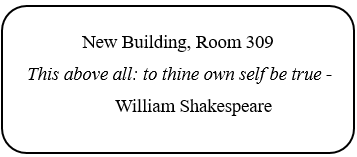
Coming out of a blackout (How many was it now?), Margaret looks up to see a shape hovering above her. Squiggly lines jump into focus as she squints, blurry-eyed. A giant nametag? No. She recognises the plaque from the door of her third-year room at uni flashed onto the ceiling. She remembers it well. Didn’t need these bots intruding, indiscriminately lifting her memories without her consent.
Just as quickly, the sign on the door is replaced by images of Charlie. He’s robed, wearing a scholar’s gown standing in full subfusc on a flat-bottomed, square-ended boat. The long pole he grips with both hands gets the better of him. She watches, ready to laugh—knows what comes next as Charlie pushes them along in the shallows on an over-due punting date. Straight out of Exams Halls, the last of their papers done and collected for marking, the whole summer lay ahead of them for doing nothing. ‘There’s no better time than the present, Meg!’ he yells.
In rapid flashes, Charlie falls in, is fished out—by her own able hands. Drenched, dripping in a charcoal suit, his bowtie in the prescribed white floats on a current that doesn’t care if the silken folds had served him well through those subsidised formal dinners, that one summer ball, to look smart for Mods in March of their first year, then Finals in June of their third. A regular ready-tied wouldn’t have come unwound in the water. But that wouldn’t be Charlie for you, would it? The bot’s holographic frames freeze on the snatch of silk as it drowns.
Steady whirr-whirrs hum in the dark. Is it Mi-Mi the First, the intractable, bullying monarch that ruled over her now? Or was her minder-bot being repaired and rebooted after another felling? Was this Mi-Mi’s substitute, the Mark 2 the human operators frequently replaced her with? At the thought, Margaret is suddenly alert. She must stay awake: her job now is to resist. No more blackouts, Meg, Charlie’s voice whispers.
Wait, hang on— Hadn’t she also over-turned Mark 2? Why was the thing still working? She must strike harder still, do more damage, not merely minor dents. Still, she’d tried. You must continue to try, Margaret reminds herself. She doesn’t need Charlie to tell her this. She must continue this fight until . . . Well, until . . . until . . . Well ….
Not every returnee was assigned double bots. Only the troublemakers.
Half a year since her arrival, Margaret had had enough of 9-9-6 and the endless exemption cases, which no matter how exonerating her supporting arguments, were always rejected. When DENIED had become a firmly fixed stamp on her psyche as well as her files, that’s when she refused to perform her assigned tasks. Who thought she’d ever prefer to not meet her clients? Now, she fought to keep them at home—wherever that was but here—for the millions who didn’t wish to come. The smallness of being a speck in the system; the inability of a cog such as herself to affect change; being nothing but a particle let alone a free agent (but still a radical) in an administration so lost in its vastness: all these things debilitated, and ate her up inside, for which being disenfranchised from the get go didn’t help. But it was this condition of being powerless—if not that EXTRA CARE exuded by the bots—that is killing her.
The bot (whichever one it is) doesn’t move.
From where she lies on her back, Margaret knows the minder is just outside her line of vision. It’s close enough to do her harm yet far enough to be out of harm’s reach. An amber flickering confirms its vicinity and tells her it’s on PAUSE. Hah! Maybe she had done some real damage. Which means she’s bought herself time. She must think fast and figure out a next move before the bot’s systems come back ON.
Somehow the behemoth controlling the bots had to be toppled. How, Charlie?
First, she needs to rub her eyes. Margaret blinks. Doesn’t stop. Her eyes itch like . . . like . . . like there’s no tomorrow. She forces herself to cry, the tears that clear her ducts moisten her eyes a while longer.
How was she to do this alone? She’d always had Charlie to help her out of every scrap. Even scrap on her behalf. Now, she must fend for herself. And so far, she’d done her best using anything she could lay her hands on: pencils, chopsticks, the knitting needles she’d tricked the bots into trusting her with. With these, she pierces the sealed joints and protective sleeves of Mi-Mi’s articulated limbs and jams the bot’s big gears. Its sprockets aren’t dissimilar to those of a high-speed bicycle. Her parries and ripostes may not be what they used to be, but Margaret finds to her surprise (and the bot’s— Hah!) she can still lunge low and lethal. The trick is to be in and out quick enough before they could activate their shields. Coach Martin would be so proud. Where is he now— In Canada? Returned? Would it be to Bulgaria, Turkey, or Greece, given his ancestors had also moved around? Parry 8 or parry 5, Coach? Beat-attack or feint-deceive?
In the room’s silence, her muscles remember other coaches: Coach Cristo counting the tempo of her steps; Coach Alex challenging her left-handed to left-handed to stay sharp— A counter-attack must always be expected! The skill is in weighing timing and distance, even with fleche, which only to the uninitiated—and her terrified mother—looked like a charging bull raging down the piste. With alacrity, yes, but calculated surprise the key element. And now, as with her epee moves, she must first defend. Then mount the offensive.
Never a champion (her closest a silver), at Nationals, the defending title-holder beat her with better shoes (the latest in top fencing tech at the time, though as Coach Martin said—after his scolding: ‘It’s all in your mind!’) At uni, it was Charlie she let down. He’d carry her bags and cheer her on, said he didn’t care if she won. But she knew he wouldn’t have minded if she did. ‘Who needs wins?’ was how Charlie laughed off her lost points, the bruise marks that emerged after touches that landed deep, that didn’t pierce the protective plastron but only injured her pride. She knew defeat alright. Yet, these principles once again would be her strength when nothing but a win would do. This belief, she must hold on to.
Margaret breathes in deep. The air has cleared and fills her lungs. Beat them, Meg! Beat the bastards! She can hear her husband cheering her on to beat her captors. Beat them, Mummy! Oh, her little Sweets.
A sudden click and the beams resume on the ceiling. There’s Saul now, blond like Charlie, their son’s tinkling laughter a cascading waterfall. Little Luna is shown on the ceiling and walls devouring a yellow-peeled banana— How wrong! Her daughter’s tastes and disposition didn’t countenance mush. The slightest whiff of ripe would make Luna turn up her nose. The child ate by texture, never flavour. Margaret looks away as the images of her daughter dissolve. Other bananas emerge. In a bowl: still yellow. In clustered bunches on trees; on trucks, transported on a ship: all green. Ah! —Was Mi-Mi the First or Mark 2 thinking on its feet (those neoprene casters)? Or was Margaret seeing mind reading where there was none? Was she going bananas?
That smell: gas. She recognises EXTRA CARE’s killing breath for what it is: narcotic warfare at its worst, or close enough. The relative degrees of human-on-human degradation isn’t something she wishes to quibble presently. She feels herself slipping, wonders what other horrors could be going on outside. Craning her neck, Margaret tries to lift her head. How could she forget? She’s strapped to a gurney. She wants to be jelly, to turn herself liquid and malleable. Like the mum in The Incredibles. Yes, she was incredible! The thought makes her laugh aloud. Though also old, that animated film both her children loved. With a smile now, Margaret squirms and wriggles in an outburst of jerks, first to one side then the other. The effort drains, but she knows it’s got her nowhere and feels it coming back: Nearly there now . . . Almost . . .
She strains to hold her eyes open. Hah, take that! She fights it off, you want to fight, you do, you try. Fight this, Margaret!
Still, the dark encroaches, claiming its hold . . . But not quite, not just yet.
No, no, no . . . She feels herself blacking out.
Again.
You look up into nothingness, then down at your listless form and wonder what time it is. How long was she out that time? Margaret closes her eyes. Unravelling this time around, time’s cloak doesn’t lift but falls away like a giant ball of wool. From that knitted cloak, Margaret thinks, happy to be holding a thought—any thought. She tries to stretch, feels nothing in her toes. Decompress. Refill. The twins’ soft toys emerging from their packing cubes. Breathe in, exhale— No! The air is bad. Shallow breaths, blow out. Defend, Margaret! Use your parries! Think of the kids . . . How are they Charlie? Say they’re doing well. You want to hold them close. Clutch them—the kids, not Saul’s one-eyed Paddington, not Luna’s Kermit.
Your stomach tenses. You wait, anticipate, expect the worst. You’re prepared for more of the opium that’s shrivelling your brain. Had she missed another call with Charlie? Kids doing good, Charlie? How well? Tell me . . . Discordant thoughts issue blindingly. A giant melon zooms in and out of focus, its bloody insides exploding brains in palely translucent hands as shimmering fingers come into view attached to a wobbly Charlie. The over-ripe melon injected with Pimm’s. The bad idea which landed him in her parent’s bad books for the longest time . . . You’re lashing out, immediately regret it. I’m so sorry, Charlie! And now it’s in the memories of your life curated by bots. Like Luna, sobbing each time she called Saul an inside-out-banana, you want to take it back.
Green. The bananas are green.
You want to stay awake.
The quote on your college room door comes rushing back into the frame: To thine own self be true. You fancy the donating alum must have picked the phrase herself. From Hamlet, you’d taken the father’s advice for his son at university to heart, as did Charlie (if a little too much). The New Building the room was located in lived up to its name despite being old. A sense of place oozed from its walls and filled you from being there and being part of something so much larger than yourself, of being inspired and humbled in the same breath— This didn’t happen overnight. You cherish its substance, the substance you imbibed there once, like the fumes in this room.
You see Margaret Gold née Chen tapping into that solidity as she lies prone. You remind yourself as you were reminded day-in-day-out coming and going through that door: Be true! . . . Your eyes grow heavy . . . heavier. Curtains down, Hamlet.
Again.
#
DAY 303:
—I am outside a school in Krakow’s old city. There are many other small humans besides Saul: the boy who doesn’t stand still, and Luna: the girl with gentle hands. I escort them to-and-fro: house-to-school, school-to-house. The route I am shown is the shortest. I find a different one without cracks in the pavement. All about, my scanners detect bots lurking in the shadows. First generation, out of date, past-spec. Their once-shiny shells are matt; their wit-boards dented, impaired. One of them, a foreign-make, is recharged by a bitcoin hurled in pity. I know their kind. They have been discarded. Their time is past: only BUY LOCAL finds purchase now anywhere in the world. I make a note:
—Is discarded the same as HOMELESS?
#
Charlie pressed AFTER SCHOOL ROUTINE on the bot’s apron and looked at his watch. It was just after one, almost time to call Meg. ‘Saul refusing to come in again?’ he asked.
‘Saul is playing under the tree.’
‘Right, leave him to me.’
Approaching the oak, Charlie picked up Saul’s plastic sword, cast aside into the grass. Without warning, like a bullet to his chest, he was instantly reminded of Meg. His crazy fencing girl! Those days, so long ago now, also felt recent. She was amazing on the piste; Meg was owed a win. No one tried harder than her. Could he compare it to VE Day for Poland that had never come in WW2? Why not? (Had he mentioned, two of his ancestors were crack aviators?) He should have been hearing stories of the legendary exploits of the ‘Champions of the Battle of Britain’ in Poland over pierogi not having to grow up in Edinburgh consuming shortbread. The forgotten histories curdled in Charlie’s gut. As did this word: ‘Polack’. His jaw clenched at memories of the jibes that that had never grown old and wounds that never really healed, that his children would now be spared. If Joe Public in the UK didn’t like to hear ‘foreign talk’ on the high street, they wouldn’t now. Well, where they still had high streets, that is. And returned here, there’d be no over-crowding like where Meg was. But he’d told her to not even try to fight. Be practical. Stay alive. This is what their lives had come down to. Ouch, what the— An acorn was hurled at him.
Above Charlie’s head, legs dangling, Saul wore a frown.
‘You need to stop this, son.’
‘Why? I’m not hurting anyone.’
‘No. But you might. Then we’ll all be in trouble.’
‘Even Mummy?’
Saul, more than Luna even, had always been closer to Meg. Theirs was a bond which defied DNA counts, borders, relocation notices. Charlie closed his eyes and took a deep breath. ‘You needn’t worry about Mummy. She won’t get into trouble. And if she does, your mother knows how to take care of herself.’
How hollow his words sounded. Charlie could almost sympathise with Churchill and the decisions he’d had to make at Yalta. Just as securing Great Britain’s future saw Poland’s scuppered, Meg was the sacrifice for his, Luna, and Saul’s wellbeing. The collateral damage. The price of peace. Another thing to ‘never mind’. What a heel of a husband he was! You’re a complete tool, Charlie! How could he face her thinking these thoughts?
Blinking back bitter tears, Charlie reached up and pulled gently on his son’s legs. He eased a squealing Saul onto his shoulders and called out towards the open French doors of the library—now his home office and where his daughter would be parked on the sofa.
‘Luna! Come join us here. Come outside!’
‘Mum’s on the satellite!’ she yelled back.
‘It’s OK, come! Mol’s there. She’ll talk to her.’ What was he doing, screwing Meg over? Never mind repeated in his head. There was no way for him to help her from this far away. And he was doing it for the kids. He thought of Churchill again: No, the man was no coward. There was only so much one person could do. It was for the best. Forgive me, Meg. Swallowing hard, I’ll call her later, Charlie told himself.
#
A woman appears on the screen. My predictive linguistic modelling sensors flash with negative descriptors: DISTRAUGHT. FORSAKEN. ABANDONED. HOMELESS.
In the fluorescent glare, a standard Chinese bot fills the screen. ‘M1-M1’ it says on the gleaming name plate. ‘Speak Chen Jin,’ the bot says.
‘Who? What’s that? Where’s Charlie?’
A billowing diffusion gusts forth from M1-M1’s top. In the silence, a calm appears to descend over the human. Minutes pass: three and forty-eight seconds, before the bot replies. ‘It is the nanny-bot of your children, Chen Jin.’
Do I imagine an inflection, a light snigger from the red-bodied bot? No, it is real: a synchro recording check confirms my hearing and grounds my assessment: This bot is a small-minded thing. Three seconds have ensued, I must reply with diplomacy: ‘I am MOL, Margaret,’ I say slowly to the woman layering my speech with treacly candy-apple warmth. And to the piece of work, that lump of metal stationed closely beside her, I proffer coolly in Arctic blue intonation: ‘Send me her medical stats. I would like to examine the data.’
‘MOL? Who are you? Where’s my Saul. Where’s Luna? And Charlie! Where’s Charlie?’
The bot interjects, appearing to not have heard my request. ‘Chen Jin must sleep. It is getting late. We will talk more next time.’ Transmission is abruptly halted.
I make my notes:
—1. Untruthful bots lie through their grills.
—2. Although she has returned home, Margaret Gold née Chen is homeless.
—3. Homelessness is inappropriate subject matter for comedy.
#
‘How was she?’ the human called Charlie enquires after some hours.
At risk of ischemic heart failure. I don’t tell him this, nor of his wife’s growing addiction. My factory settings, left unchanged remain fixed on BLISS MODE. Another gaping silence fills the room. I note the weight shifting in Charlie’s chair. His breathing, as is his heart, is heavy, but this male will live. His data confirms it, albeit peace of mind is highly doubtful. But what’s this? Is Note 1 to be deleted? I deliver the health stats incoming from M1-M1:
‘Her blood flow is normal.’
‘That’s good,’ Charlie says.
‘Yes.’
‘Keep me posted, Mol.’
‘Yes.’ I make another note:
—4. Provide updates, unless there’s no more to tell. Until then, I must stay mum.
About the Author
 Farriz Mashudi is a former lawyer, journalist, and blogger, turned writer of both CNF and fiction in short and long forms with a penchant for the speculative. Born in Malaysia, she has lived in Canada and the UK. She currently resides and works in the Middle and Far East amongst a plethora of local and expatriate cultures that both inform and colour her writing. Robots, she’s currently obsessed with.
Farriz Mashudi is a former lawyer, journalist, and blogger, turned writer of both CNF and fiction in short and long forms with a penchant for the speculative. Born in Malaysia, she has lived in Canada and the UK. She currently resides and works in the Middle and Far East amongst a plethora of local and expatriate cultures that both inform and colour her writing. Robots, she’s currently obsessed with.
![]()






